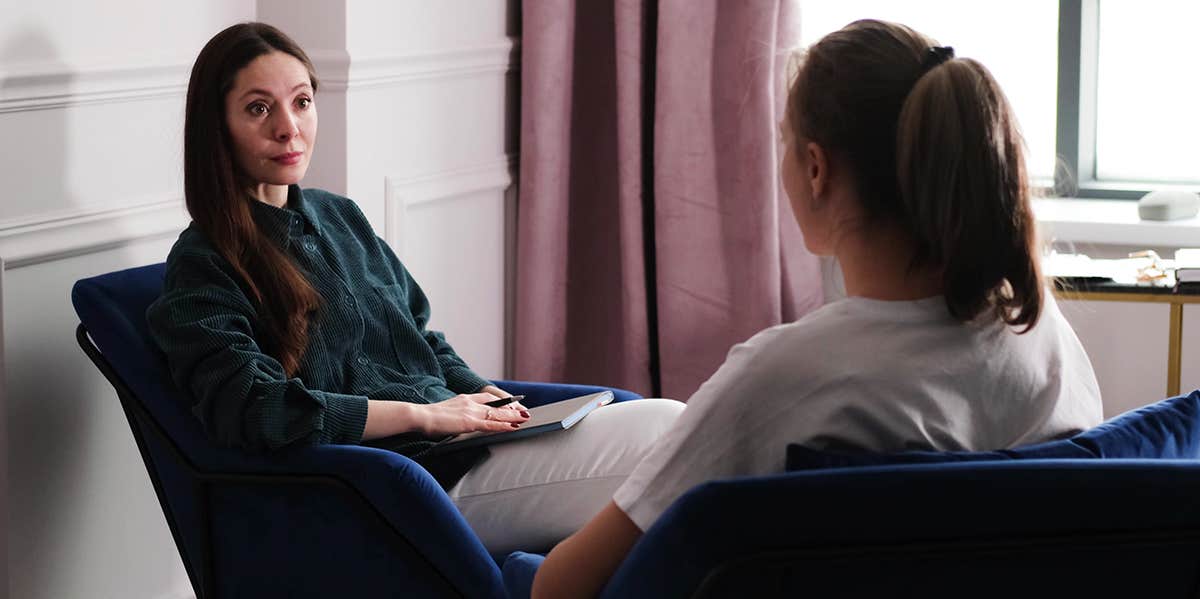A Guide To Becoming A Strong, Self-Made Woman In Therapy
You can benefit greatly from therapy, and so will your relationships.
 Ekaterina Byuksel / Shutterstock
Ekaterina Byuksel / Shutterstock I have had multiple requests for a female-focused version of this post on the self-made man in therapy. The self-made woman has some overlap with her male counterpart in my experience, but there are some key differences too.
By self-made, I am referring to a woman who grew up in an environment without a lot of resources, generally poor, and/or with parents who were dysfunctional in some way (e.g., depressed, alcoholic, etc).
She pulled herself up out of that environment by studying and working hard, going to college and possibly graduate school, and currently earns what would commonly be considered a lot of money in a high-powered job (or owns her own business).
Often, as a parent, she has read every single parenting book on the market, with the avowed goal of giving her kids the healthy parenting experience and happy childhood that she never had.
This sort of woman can go either of two main ways in terms of finding a partner. Either the partner is similarly high-powered, and they become a “power couple,” or she finds a partner who reminds her subconsciously of her parents and upbringing, who is an underachiever, and she is the primary earner and the motivator of this beleaguered, un- or under-employed spouse.
In the first case, the self-made woman can find either another self-made partner or someone who grew up with money, in the type of childhood that she wishes that she had.
Two self-made people are generally more compatible on a deep level, although their children may feel like they can never live up to their parents’ high expectations, in which case this dynamic can occur. When two self-made people find one another, they can feel deeply known and understood.
They often partner together to create and design the life they always yearned for, in a mutual admiration society that, sometimes, can veer into a narcissistic folie a deux (shared delusion) where the couple considers themselves, as a unit, far superior to anyone else they encounter.
In contrast, other self-made women partner with underachieving “problem” people who remind them on a deep level of the upbringing that they escaped from.
They can end up in the dynamic I call The Man-Child And His Long Suffering Wife or just take a generally codependent role with a partner who suffers from mental health, addiction, or other issues that prevent them from achieving their “potential.”
The woman then spends a great deal of her energy trying to motivate this partner or soothe their ego.
Imago theory suggests that the fantasy here is to help this partner succeed and be “normal” in a way that the woman was never able to change her parents when she was a child.
As with the self-made man, the self-made woman has generally stuffed her needs and vulnerabilities deep down in order to get ahead.
Women are supposed to be cheerful and positive according to society’s mandates, so she also has had to self-police in order to come off the “right way” and be attractive to men while simultaneously focusing on getting ahead. Later in life, when she can finally sit back and rest on her laurels, she may feel empty or restless. Without constant forward motion, she may feel anxious.
Partners and children of these women are often frustrated by their inability to just sit still or enjoy life.
They may be seen to be overly Type-A and “unable to relax.” They may be seen to be unaffectionate, cold, or joyless. The very same characteristics that are lauded at work may be criticized at home. Often, the self-made woman has very little patience for her spouse’s or kids’ mistakes or perceived laziness.
While this woman gives her kids everything (often both materially and experientially), she may then be frustrated by their “lack of grit,” which ironically may derive from their relatively cushy lifestyle.
When the self-made woman approaches midlife, she may feel like she doesn’t know her way forward.
Often, in therapy, these types of women can benefit from deep, insight-oriented work. First, they need to process their grief and sense of loss due to their childhoods of physical and/or emotional neglect.
Then, they need to figure out their identity without a constant focus on getting ahead and jumping over every subsequent hurdle. Often, they need to figure out how to be the partner and mother that they want to be, as they may not have seen role models in this area as children.
Therapy can be profoundly useful to the self-made woman, and she often wants to work deeply, at a quick pace, in the same immersive and intense way that she works on other areas of her life.
If this post resonates with you, consider introspecting about what being a self-made woman has cost you internally and emotionally.
Reading books like Running on Empty may also help you understand yourself better. And of course, therapy is often a useful route to help you understand your past and the ways you can live a more authentic-feeling life.
Dr. Samantha Rodman Whiten, aka Dr. Psych Mom, is a clinical psychologist in private practice and the founder of DrPsychMom. She works with adults and couples in her group practice Best Life Behavioral Health.
